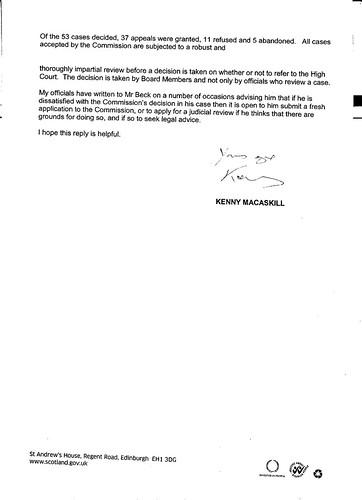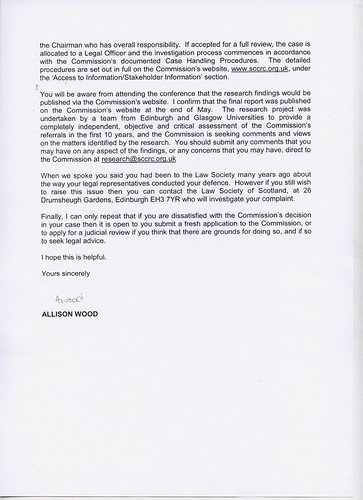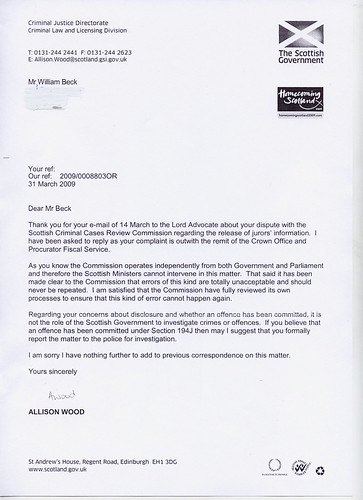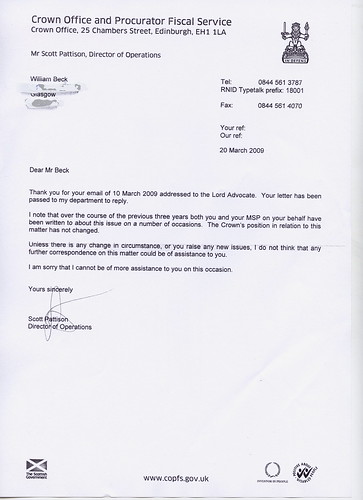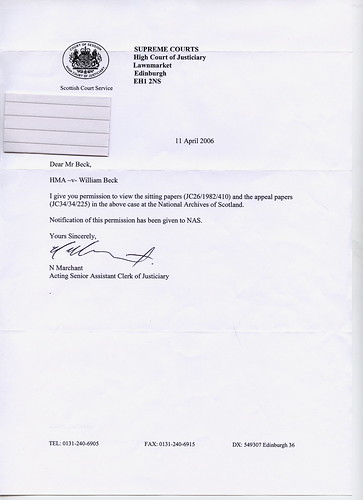The following was what I handed to Kenny MacAskill at the SCCRC ten year Conference and to which I still await a reply.
I also handed this to my own MSP Bill Kidd who wrote to Kenny MacAskill which will be published shortly here.
The Scottish Criminal Cases Review Commission – A Critique
Introduction
It is now 10 years since the Scottish Criminal Cases Review Commission (SCCRC) was established under section 194 of Crime & Punishment Act 1997 and the question posed by this paper is should a review be carried out into its the powers, responsibilities, operation and funding.
In terms of the prevention of injustice within our justice system the SCCRC is the last port of call for those seeking to right such wrongs and as several high profile cases like that Al Megrahi
have shown it has an extremely important part to play.
Alongside its undoubted success comes the criticism that it is guilty of wielding power without responsibility, is unaccountable and in a number of important respects has failed to mature and develop satisfactorily.
Such criticisms are not lodged against the individual commissioners but against the organisations as a whole.
I have highlighted what I consider to be some of the major issues that should be examined in any review of the SCCRC.
It seems an appropriate time to carry out an independent review of the SCCRC and examine questions like has the commission’s independence been compromised by its becoming legally dominated and is it too closely bound to the culture of the Scottish legal establishment?
Basically just how effective is it as an organisation in delivering its brief?
All I have been able to do in this short paper is suggest areas for examination and refer to a number of cases where I believe their work has fallen below the high standards we have come to expect.
Independence of SCCRC
When the SCCRC was established it was anticipated that only one third of the commissioners would be from the legal professions –Judiciary, lawyers etc.
‘(5) At least one third of the members of the Commission shall be persons who are legally qualified; and for this purpose a person is legally qualified if he is an advocate or solicitor of at least ten years' standing.
(6) At least two thirds of the members of the Commission shall be persons who appear to the Secretary of State to have knowledge or experience of any aspect of the criminal justice system; and for the purposes of this subsection the criminal justice system includes, in particular, the investigation of offences and the treatment of offenders.’
Despite this 95% of the current commission could be said to come from the ‘legal establishment’ and inevitably the SCCRC independence is called into question.
The Chief Executive Gerard Sinclair is a lawyer and not only controls the day to day running of the SCCRC but he sits as a Temporary Sheriff and on Law Society Committees. Effectively Mr Sinclair holds four positions within the legal establishment and I believe this has serious implications for the culture of the organisation.
Gerald Gordon QC as well as sitting as a Commissioner sits as a judge in High Court Trials and Appeals and while I can see the value of this in certain cases I would also argue that it could be seen to compromise the SCCRC’s independence from the Judiciary.
While the integrity of the commissioners is not being called into question there must be legitimate questions asked as to whether the balance of interests being represented as envisaged when the SCCRC was established has been kept. This also raises cultural issues and claims that the organisation holds the same principles and values of the justice system it is seeking to monitor.
Robin Johnston has been the Senior Legal Officer of the SCCRC since inception. Although the establishing Act clearly lays down that this post shall be filled by an advocate or solicitor of at least ten years standing it appears from the SCCRC website that Mr Robin Johnston only qualified as a Solicitor in 1996.
See http://www.sccrc.org.uk/management.aspx
Lack of consistency
Referral Policy
There appears to be growing evidence of a lack of consistency by the SCCRC in evaluating cases and passing them back to the appeal courts. I have examined the following cases referred to the SCCRC (see appendices) and have found that evidence accepted as grounds for referral in one case is not accepted in another.
Cases Not Referred for Appeal
William Beck
William Gage
John (Jocky) Robertson
Edward Milne
Robbie The Pict
The Edinburgh Three, (Brian Meighan, Kevin Kane and David Pugh) Also Judicial Reviewed SCCRC
Cases Referred for Appeal
Al Megrahi
Ronald Neeson
Stuart Kidd
Stewart Gair
Jamie Orr
James Kinsella
Raymond Gilmour
See Appendix.
Application of current law
The SCCRC have a policy agreed with our appeal courts that they will only refer cases on the law as it is today and not as it was at the time of conviction. In the case of Wullie Beck however despite an acceptance that the conduct of his identification parade did not comply with the law as it stands today the SCCRC refused to refer his case.
Lack of Investigation within SCCRC
On the face of it there appears to be a case for arguing that in some cases the SCCRC does not carry out a thorough or comprehensive enquiry.
This could of course be due to a lack of the proper expertise or be related to a lack of available resources or a mixture of the two.
It is clear for instance that the three year Megrahi enquiry was expensive in terms of time and money and probably involved the use of an inordinate amount of SCCRC resources. While given the serious issues at stake this is understandable we require to be assured that other cases did not suffer as a result of this concentration on the one case. There is a sound argument that no case should be seen as being more important than any other if there is a suspicion that injustice might be present.
Time and time again I have found evidence of:
Failures to Interview pertinent witness's.
Failures to seek and gain Forensic Evidence.
Failures to ask for independent expert opinions - Campbell & Steele, Gilmour, Johnston & Allison etc.
See Appendix.
Defective Representation (Anderson V HMA & Hemphill V HMA)
Analysis of the figures for defective representation as a ground for referral to the SCCRC make interesting reading.
For the eight year period to 2007 178 defective representation appeals were made. Of these only 2 were referred
Claims of defective representation constituted 18% of the appeals made to the SCCRC.
Effectively we have the biggest ground for appeal having the lowest success rate.
From a SCCRC perspective the conclusion must be clear that 98% of these Defective Representation referrals had no basis whatsoever. This in turn must mean that this ground for referral is being misused by applicants as a way of escaping justice or that the standard of proof required is not understood by those appealing.
There is however another possible conclusion and that is perhaps it points with startling clarity to cultural or other bias by the commission members/assessors who because of conscious/unconscious bias or assumptions about the efficiency of the law profession cannot, rather than will not, see the validity of the claims.
I believe that the cases of William Gage and my own provide ample evidence of failures by defence lawyers to effectively represent their clients in court.
In my referral to the SCCRC I submitted that my defence teams representation was defective on a number of grounds in that they failed:
To interview and call 16 defence witness's
To call crucial Forensic evidence.
To properly challenge identification evidence.
To call crucial Crown witness's capable of contradicting the Crowns case.
To ask crucial questions of defence witness's.
To call his solicitor who after viewing Mr Beck’s ID parade claimed that a police witness had selected Mr Beck before turning to view an ID parade.
To consult with the accused or his solicitor before closing the defence case.
SCCRC never saw fit to ask his defence team why they done this nor did they see fit to ask any of the witness's if the defence team interviewed them prior to trial.
See Appendix.
Perverse Powers Sought By SCCRC.
In a judicial review in the case of Mohammed Razza by Lord Emslie the respondents, the SCCRC, argued that when established by section 194 Crime & Punishment Act 1997 they had the power to decide cases only on the ‘Miscarriage’ test and even if ‘prima-Facie, arguable and statable grounds’ exist they can refuse to refer. They appeared to blame Parliament for not allowing them to refer cases on such grounds.
http://www.scotcourts.gov.uk/opinions/2007csoh152.html
While on the face of it this appears to place limits on the cases referred Lord Emslie did not see it that way.
‘[43] On a fair reading, therefore, the relevant section of the report seems to me to confirm, not only the respondents' laudable desire to see justice done in an individual case, making full use of the wide-ranging investigative powers conferred upon them for that purpose, but also their overriding commitment to applying the correct legal test in line with the relevant statutory provisions and case law. This broadly mirrors senior counsel's contention that the respondents' approach to what might constitute a miscarriage of justice for the purposes of section 194C(a) was frequently broader, but never narrower, than the view which the court might be expected to take on a reference or appeal. In my opinion there is nothing to prevent the respondents, in the course of exercising their statutory powers, from searching for what they conceive to be "truth", "fairness", "justice" or "equity", provided that in the end of the day their decision is reached on a correct legal basis’
From this opinion it appears that Lord Emslie is satisfied that even although the SCCRC had the power not to refer even when, ‘prima-facie, arguable and statable grounds’ exist in reality this did not happen and he accepted the SCCRC position that the SCCRC’s, ‘approach to what might constitute a miscarriage of justice for the purposes of section 194C(a) was frequently broader, but never narrower, than the view which the court might be expected to take on a reference or appeal.’ He did not see any need to alter their statutory powers provided that ‘their decision is reached on a correct legal basis’.
His Lordship’s opinion however gives the SCCRC Chief Executive Gerald Sinclair and the SCCRC a great deal of discretion and trusts them always to get it right. This is not my experience and I would wish that where ‘prima-Facie, arguable and statable grounds’ exist that referral is mandatory and that the statute be amended to take account. This should not take away from their overall powers and responsibilities re miscarriages of justice.
Non Disclosure Of Evidence By Crown
Despite a Crown Acceptance (See McLeod, Holland & Sinclair and Practice Notes) that they have a duty to disclose all material evidence to the defence I am told that failure to disclose is more likely to succeed in our appeal courts than any other ground of appeal at the moment.
Sadly this is a recurring theme in most miscarriages of Justice and recently has seen cases like Gair, Kidd and Allison & Johnston referred to appeal and successful.
In Holland for example the evidence in question was in the form of a Crown Precognition and his conviction was still quashed.
SCCRC told Beck that Crown Precognitions were not like police statements and not admissible as evidence, which would seem outdated if Holland is properly decided.
A great analysis of Holland & Sinclair can be found here:
http://www.eupjournals.com/doi/pdf/10.3366/elr.2006.10.1.102?cookieSet=1
However, the fact that the offending comment in Holland in relation to the identification parade was made in a Crown precognition and that its non-disclosure was still held to be in breach of the duty of disclosure suggests that even precognitions may not be immune from disclosure.
Conclusion
This paper while acknowledging the vital part played by the SCCRC in preventing miscarriages of justice in Scotland makes a case for a 10 year review of that organisation.
There is evidence of a reduction in the credibility of the organisation and it is critical to ascertain the accuracy of that statement and to assess what remedial action, if any, is required.
Wullie Beck
Date
Appendix
ALLEGED FAILURES BY THE SCCRC: STATED CASES
It is my belief that in the cases shown below there is evidence of the following failures by the SCCRC.
Lack of consistency.
Lack of investigation.
Lack of asking for experts opinions.
Failure to acknowledge Defective Representation.
William Lewis Gage
William Gage was convicted of murder on 9th February 2004 by a majority verdict. His appeal was turned down on 14th march 2006. The appeal court refused to allow late grounds from his QC Margaret Scott. Mr Gage then took his case to SCCRC who took three years to give him an interim statement of reasons not to refer his case. They are currently reviewing the case.
Alleged failures:
They failed to consult with known experts.
They failed to interview key material witnesses before coming to conclusions.
They failed to fully investigate the complaints by Gage about the conduct of his defence.
William Beck
Mr Beck was convicted of Assault & Robbery in 1982 of which he has strongly and consistently denied any involvement whatever. He was refused legal aid for an appeal and leave to appeal was rejected when he appeared before the high court on 07/10/1982. He claims he has never had an appeal.
Alleged failures:
They failed to adequately consider defective representation by his defence lawyers including a failure to interview 16 defence witnesses.
They failed to use Current Law Policy in considering the conduct of his identification parade.
They failed to ask Crown for all documents they hold in this case.
They have failed to admit the fact they received documents regarding second ID Parade.
They failed to take cognisance and recognise the fact witness's gave Crown Statements which Crown say no longer exist.
They refused to answer material parts of Becks grounds of appeal to them.
They failed to ask any expert opinions particular identification experts despite being aware of their existence.
They failed to be consistent given that they had previously referred for issues they were now refusing.
They failed to answer Beck's claims his defence should have called crucial forensic evidence.
Edward Milne
Edward was convicted in of clocking cars while working as a Managing Director of Maxwell Motors Forfar He was fined £2000 which unknown to him the garage paid without his consent. He was told he had no grounds for appeal and subsequently failed to lodge any appeal. He has consistently denied his involvement and claimed that the Fiscal that prosecuted him was Biased and Prejudice towards him and ought not to have been allowed to prosecute.
Alleged failures:
They failed to Interview a single witness despite there being a number available.
They only interviewed his Solicitor.
They failed to recognise grounds of appeal under section 92 (1) that part of his trial took place outwith his presence. NB: The competency hearing referred to in his Lawyers letter to SCCRC.
John (Jocky) Robertson
Mr Robertson was convicted of murdering his ex wife on 18th October 1988 and sentenced to life in prison. He is now subject to a Mental Health order at Edinburgh Royal. He applied to SCCRC and they rejected his appeal in 2005. They took three to four years to investigate Mr Robertson's case.
Alleged failures:
SCCRC accepted Lothian & Borders police's word without question.
They failed to find DNA still in existence.
They failed to recognise the police showed photos before an ID Parade.
They failed to notice he was denied a fair hearing because either the police or Crown withheld ID Parade reports from Crown Productions denying Robertson any chance of challenging this crucial key material evidence.
The Edinburgh, Three Kane Pugh & Meighan
These three men were convicted of Rape in 200 at Edinburgh. They appealed and lost their case. They have served their sentence and throughout refused to consider parole. They appealed to SCCRC in 2003 which was subsequently refused in 2004. They took a Judicial review against SCCRC and lost this in front of a single Judge and they were told this was basically the end of the road for appeals. Though there seems to be an opinion from Chris Shead in their favour dated 2006 defence agents have not appealed the decision from One Judge.
Alleged failures:
SCCRC failed to comprehend that a jury member taking evidence into the jury room outwith the knowledge of the accused and the court denied them a fair hearing.
They failed to recognise the similarity of cases they had referred on the same type of evidence.
They failed to investigate and interview pertinent witnesses.
They failed to ask for any expert opinions on the material changes of evidence from the chief witness.
Cases For Comparison
Reference should also be made to the following cases:
Ronald Neeson Referred by SCCRC.
Stuart Gair Referred by SCCRC.
Stewart Kidd Referred by SCCRC.
James Kinsella referred by SCCRC.
Raymond Gilmour Referred by SCCRC.
Mohammed Al Megrahi Referred by SCCRC.
Jamie Orr Referred by SCCRC.
John Hemphill Defective Representation seen here:
http://www.scotcourts.gov.uk/opinions/82_67.html
and here:
http://www.innocent.org.uk/cases/johnhemphill/index.html
Clearly Anderson (Defective Representation) appeals are covered by Failure of the defence teams to call crucial witnesses and forensic evidence. which is evident in some of the cases mentioned but not referred by SCCRC
A final analysis:
It is clear from the many cases highlighted that SCCRC are referring cases under current law policies agreed with the high court and rejecting others with the Exact same grounds.
This is not what they were set up for nor will this practice enhance the public's confidence that SCCRC are competent enough to carry out their duties.
The same investigator Stephen Lynn is involved in three of the above mentioned cases where there is clear evidence he has not investigated thoroughly enough showing that the investigating officers are not truly representing the appellants interests when these cases call before a committee.
Should representatives of appellants (or in some cases appellants) be present to represent their clients interest and ensure all relevant points are debated at committee level, this would be a sure way of ensuring equality of arms
Mr Beck points out that SCCRC did not answer most of his issues so therefore the board could not have been made aware of them by his legal officer who went to great pains to tell Mr Beck he did not represent him.
If the legal officer is not representing the interest of applicants then exactly who does at these meetings ?





